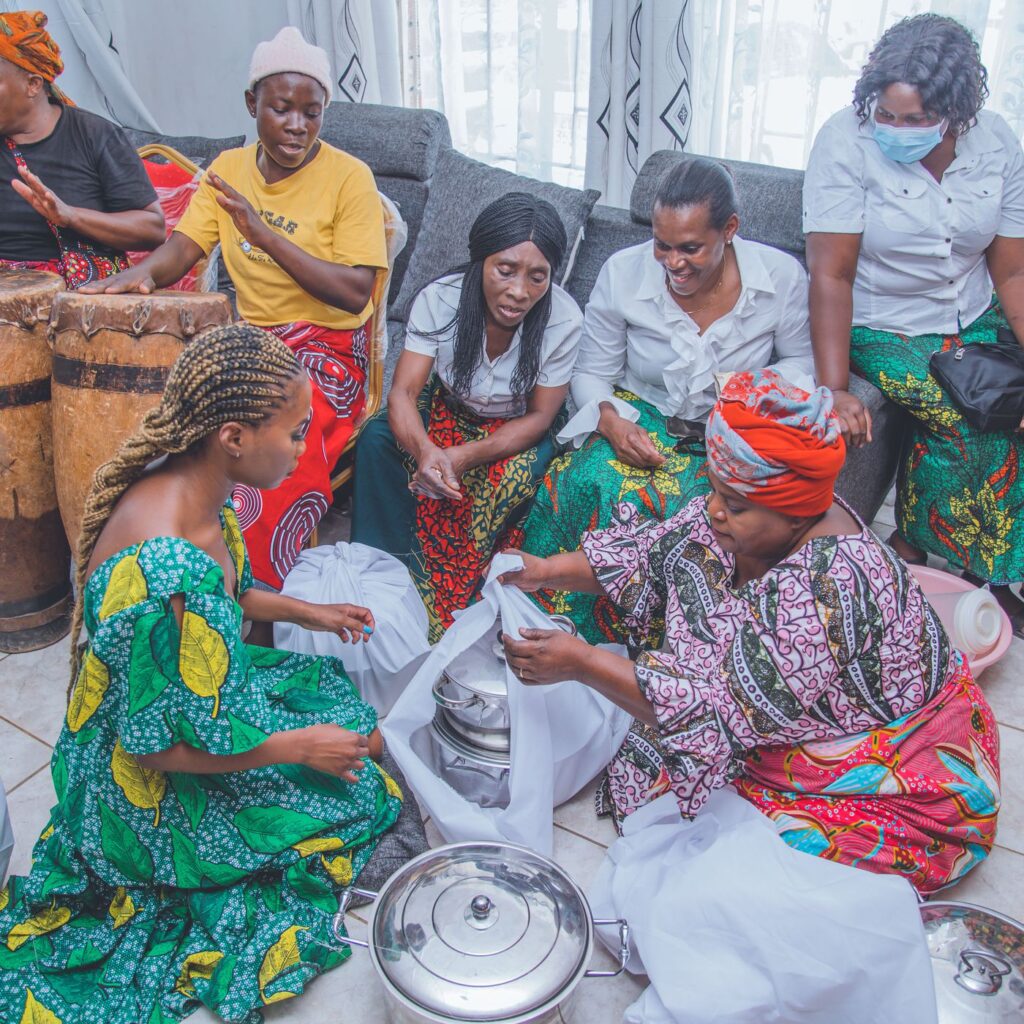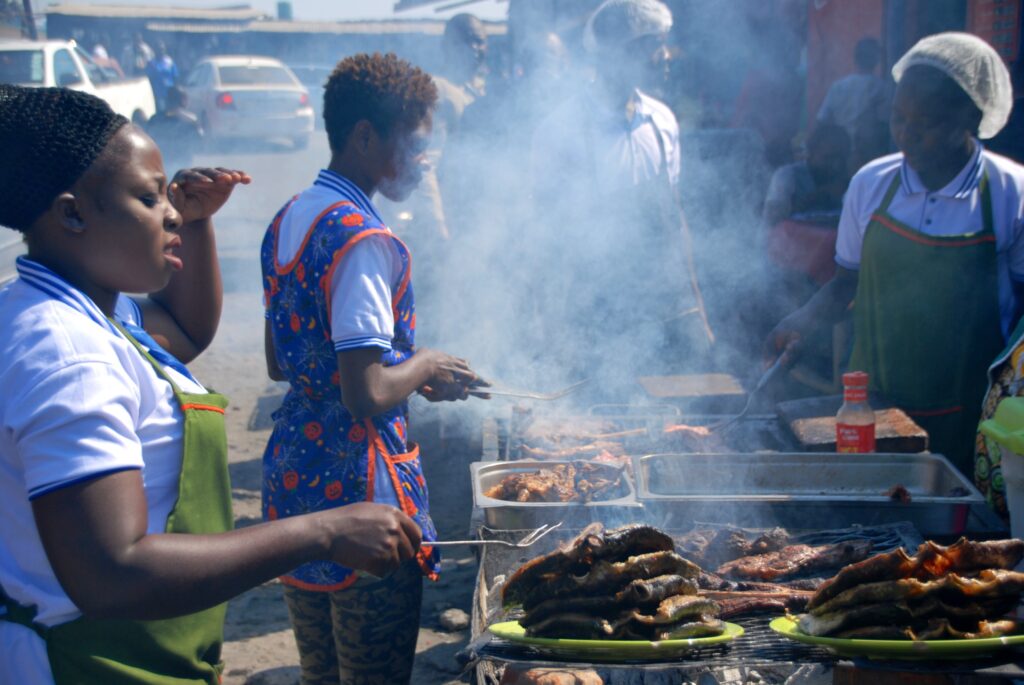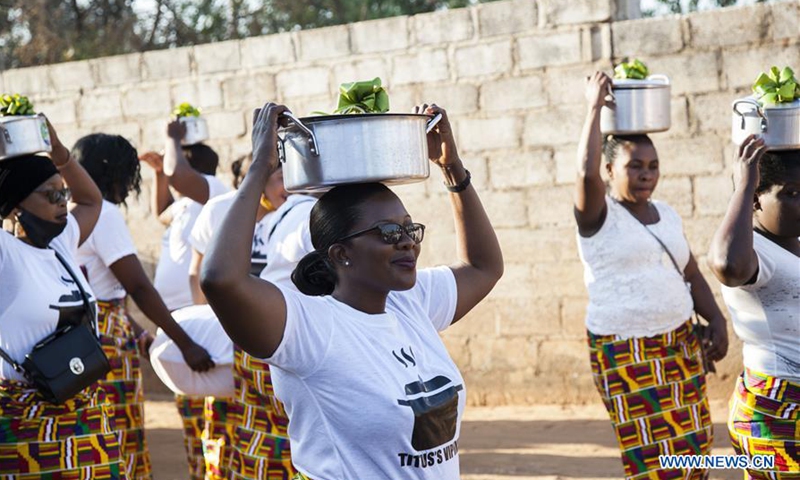If you’re a lover of culture and weddings, then you’re in for a treat! In this article, we’ll take a journey to Zambia, a country known for its vibrant traditions and customs, and explore 10 Zambian wedding customs that you might not be familiar with.
From the symbolic meanings behind the bride’s attire to the lively dances at the reception, we’ll dive into the fascinating details that make Zambian weddings truly one-of-a-kind.
Whether you’re planning your own wedding or simply interested in learning about different cultures, join us on this journey and discover the beauty and richness of Zambian wedding customs.
- Icisumina Nsalamu
- Nkobekela
- Ukukonkola
- Gifts
- Amatebeto
- Ba Shibukombe
- Lobola
- Insalamu
- Kitchen Party
- Icilanga Mulilo
1. Icisumina Nsalamu
Icisumina Nsalamu is a traditional Zambian meal that is cooked by the bride’s family and is also referred to as the meal of acceptance of the marriage proposal.

It comprises of a whole chicken and Nshima, a thick porridge made from maize meal. The groom is then given this meal as a sign that the family has approved of his proposal to wed their daughter.
This action conveys that the bride’s family is in favor of the union and is happy to have the groom join them.
It’s important to note that the groom is not required to provide anything back in the form of a gift or cash of any kind in return for this favor.
2. Nkobekela
In Zambia, Nkobekela is the meal between when the marriage proposal is accepted and the wedding day.
The couple is assisted during this period by local elders who instruct them on traditional beliefs and practices connected to married life.
The pair has the chance to get to know each other and their families better during this time. It’s crucial to remember that the pair is constantly watched anytime they are together, either by their grandparents or a young child.
This helps them improve their relationship prior to the wedding day and ensures that they follow cultural norms and traditions.
3. Ukukonkola
Ukukonkola, an important meal prepared by the bride’s parents for the groom, is common in Zambia. The meal, which is consumed at the in-laws’ home, is quite symbolic.
By making this gesture, the bride’s family gives the groom permission to make decisions that will have an impact on his wife’s family.
They promise to respect his decisions and give him the authority to make decisions without their input.
Following the lunch, the groom is given a formal introduction to the family and is treated like one of the kids.
As part of the custom, the groom first enters the bedroom of his future in-laws, removes the bed cover and linens, and looks under the mattress for any treasures.
Afterward, he enters the living room, takes the pillows out, and grabs any valuables he discovers there.
He is then brought into the kitchen, where he consumes everything that is in the pots. It’s odd that he has to take any leftover food home with him.
This custom represents the family’s desire to share their resources with the groom and their welcome of him into the family.
4. Gifts
When the bride’s family is first visited by the groom’s family in Zambia, the groom’s family brings a special gift.
The groom’s family, led by Ba Shibukombe, presents a constructed hoe wrapped in fabric to the bride’s family. The gift is a symbol of the value of earth agriculture and fertilizing in Zambian culture.
The groom furthermore provides some cash and white pearls in addition to the hoe. Prior to being delivered to the bride’s family, these objects are placed on a small plate and covered with a matching plate.
Giving these gifts to the bride’s family is a symbol of the groom’s family’s appreciation for them and their readiness to support their daughter.
The custom has huge cultural significance in Zambia and acts as a ceremonial meeting between the families of the bride and the groom.
5. Amatebeto
In Zambia, the bride’s family prepares an important Thanksgiving meal known as amatebeto. After the wedding ceremony, the groom is given a meal as a token of appreciation for his ability to keep the union peaceful.

Despite the fact that this meal is often cooked two or more years after a marriage, it represents the groom’s capacity to support his wife and sustain a positive relationship.
In Zambian culture, the Amatebeto is a crucial wedding custom that gives the bride’s family a chance to bless the union and show their gratitude to the groom.
Both families strongly value this act of kindness, which serves as a witness to the groom’s devotion to his wife.
The tradition of Amatebeto serves as a reminder of how crucial it is in Zambian society to sustain a solid and healthy marriage.
6. Ba Shibukombe
The ‘Ba Shibukombe’ serves as a crucial intermediary or mediator between the two families in Zambia.
This person is often a man of outstanding integrity who is well respected in the neighborhood. He is in charge of organizing the first meeting between the families of the bride and the groom and bringing some gifts for the groom to give to the bride’s parents.
If the initial meeting goes well, the Ba Shibukombe is invited back for a second meeting with the woman in attendance.
The woman is now questioned about if she is familiar with the individual the Ba Shibukombe is standing in for. If she recognizes the groom, a second meeting to talk about dowry payments is scheduled.
The Ba Shibukombe arrives at the second meeting with unique dishes from the groom’s family to present to the bride’s family as a token of thanks.
The groom’s family is formally introduced to the bride’s family by this act, which shows his devotion to them and his respect for them.
The Ba Shibukombe’s participation in the marriage ritual ensures that it is carried out with dignity, respect, and integrity.
7. Lobola
Lobola, commonly referred to as bride price, is a significant part of the wedding custom in Zambia. Traditionally, lobola, which was paid in cattle and poultry, was exclusively offered for virgin girls. Today’s families, however, have changed their demands and have modified their expectations.
Many families now request a chitenge fabric, a dress, and canvas shoes for the mother of the bride in addition to a pair of shoes and a suit for the father in place of livestock.
Two blankets are frequently required as part of the bridal price as well. The commodities sought as lobola have changed over time, reflecting both the development of Zambian society and the shifting needs of households.
Lobola, which signifies mutual respect and fidelity between families, is still a significant component of Zambian wedding customs.
8. Insalamu
In Zambia, a guy often takes a symbol of his commitment to the lady’s parents when he and a woman decides to get married.
This sign is given as an engagement gift and might be in the shape of beads or cash. The marriage can be negotiated if the parents have given their approval.
In addition to the passion and devotion of the marriage to one another, this tradition reflects the value of family and respect for parents in Zambian culture.
9. Kitchen Party
The kitchen party is a distinctively Zambian custom that takes place before weddings. It is a celebration where family members from both the bride’s and the groom’s sides gather to support and counsel the bride.
The occasion for the families to meet one another and formally welcome the pair into each other’s families is provided by this function.
The kitchen party is a pleasant and celebratory event that frequently features dancing, cuisine, and traditional attire.
10. Icilanga Mulilo
Icilanga Mulilo, a pre-wedding tradition in Zambia, involves the bride’s family cooking a feast for the groom.
Ichilanga Mulilo, which translates to “showing of fire,” is a pre-wedding event in Zambia where the groom and his family are introduced to the bride’s family’s traditional recipes.

It’s the first time the groom is traditionally allowed to eat at the bride’s house. Before the food is served, the groom’s family will drop money on the floor as a sign of appreciation.
During the courtship phase, the groom is extended an invitation to eat with the bride’s family at this supper. Even if it’s something new to him, the groom is obliged to try every dish.
A group of women cook the food at a relative’s home and then deliver it to the bride’s residence. The women arrive and wait for an invitation, which is given by scattering cash around, before going inside.
They enter the house while walking backwards and singing. Another invitation in the shape of money is placed on the ground before the food parcels are set down.
This event serves as a bonding moment for families to gather and spend time together before the big day.
During Ichilanga Mulilo, the bride’s family not only cooks the dishes but also explains the significance of each dish in their household.
Popular dishes include ifisashi, chikanda, kapenta, and munkoyo. The event involves singing and dancing, and once the groom’s family has enjoyed the food, the ceremony is complete.
Source
https://zambiawedding.org/zambia-wedding-traditions-10-interesting-customs/

